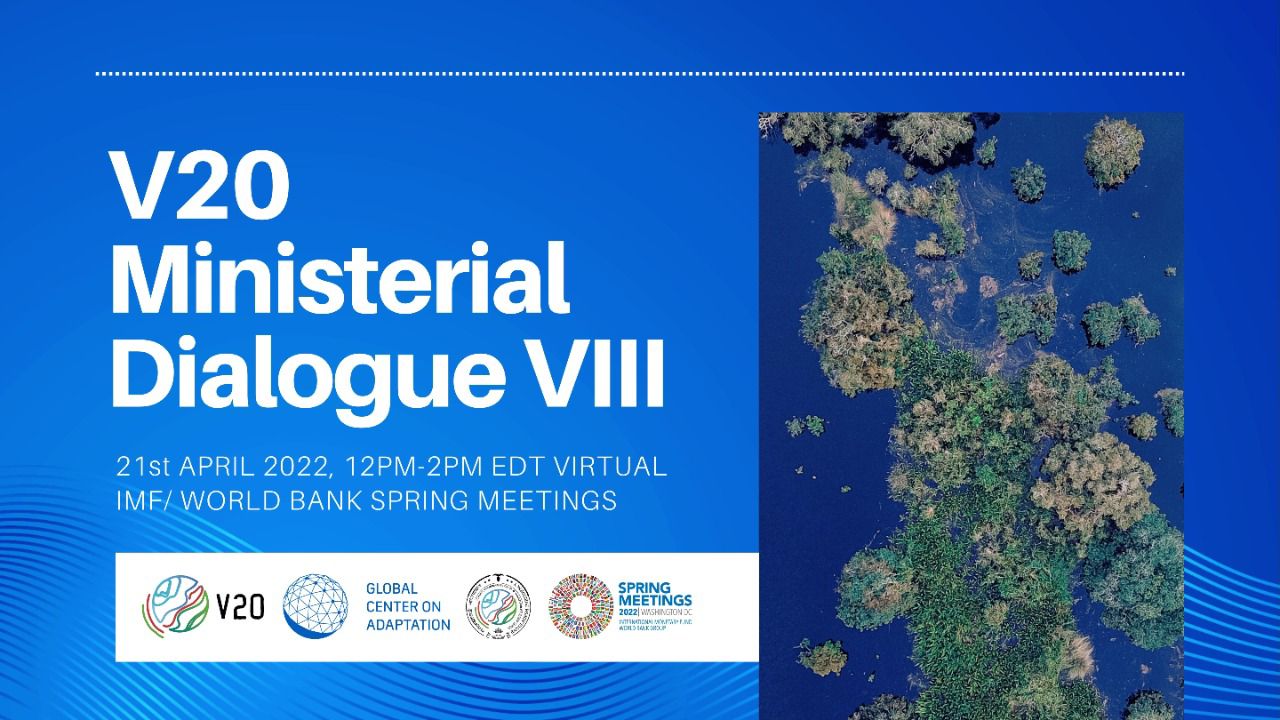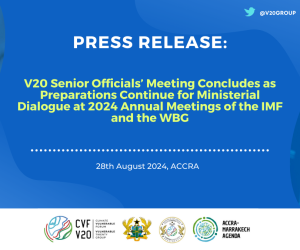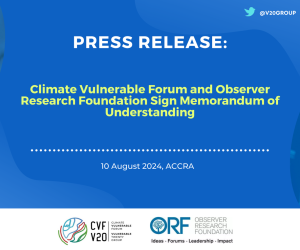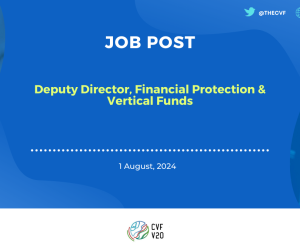V20 Ministerial Communique VIII
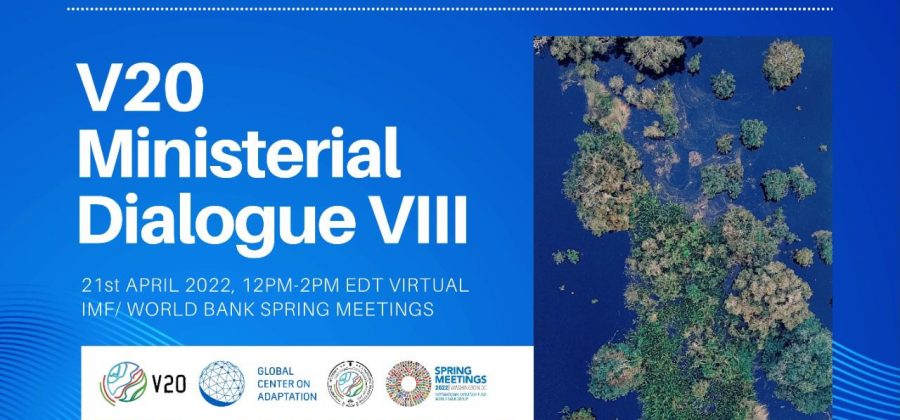
V20 Ministerial Communique
Ministerial Dialogue VIII of the Vulnerable Twenty (V20) Group
21 April 2022 – Virtual
Adopted
Headline concerns (“our top concerns and opportunity areas”):
- As climate vulnerable economic managers, we nonetheless see new opportunities in building on the COP26 outcomes from the UN climate summit in Glasgow. Decisions for keeping 1.5ºC threshold target alive, including advances in international financing for loss and damage, and the doubling of adaptation finance, need to be realized while taking advantage of the current surge in fossil fuel costs to crowd investments into renewable energy and storage, while raising debt restructuring and credit enhancement as a climate resilience tool to safeguard creditors’ assets and vulnerable economies and unlocking new climate resources and ambition.
- The ongoing impact and recovery pace of the COVID-19 pandemic, which could undermine climate action and trigger further instability in the world economy given the growing impacts of climate change alongside a global energy price crisis driven by conflict in Ukraine which could undermine climate action and other knock-on effects that can trigger further instabilities for the world economy. The growing contingent liabilities are due to worsening extreme weather events combined with increasingly volatile, expensive, unreliable fossil fuels are further harming our ability to power our economies.
- The key concern is funding and liquidity to deal with crises of growing complexity. We are also painfully aware that the liquidity crises that most of us are facing are not all of our own making. A global financial system unresponsive to climate change realities mean, more developing countries are forced into situations of fiscal distress or default, not because of long-term insolvency, but due to a lack of cash on hand, hard currency, and exchange rate volatility and that shorter-term liquidity challenges are where the international public finance community and central banks can help.
Shared challenges (“what we face”):
- As climate change intensifies, per findings of successive IPCC AR6 reports, growing loss and damage due to insufficient adaptation responses and a 98% prevailing financial protection gap, is a fast emerging and major macroeconomic concern for the V20.
- COVID-19 pandemic direct and indirect economic shocks including increasing debt burdens because of demands on public spending for pandemic response, compounded by systemic climate vulnerability and abject lack of liquidity or access to official or market funds for climate action.
- The severe indebtedness or state of debt distress of a number of V20 members, particularly SIDS, with debt repayments in certain cases exceeding public expenditure on health, which is walling-off public options for investing in climate action to protect our economies, underscoring the urgent need for debt relief and restructuring and the importance of reversing the alarming trend of an increasing proportion of loans in international climate finance.
- The war in Ukraine has compounded supply chain cost pressures and led to a dramatic increase in fossil fuels embedding rising inflationary risk and costs of ensuring ongoing energy access to the poor, presenting further threats to food security and regional stability in worst affected zones.
- Climate change impacts continue to weigh on the cost of capital and on credit ratings, driving high risk premiums and capital costs of the V20, where higher relative costs of capital continue to prevail as a primary hurdle to financing the adaptation of our infrastructure and progress towards the Climate Vulnerable Forum’s (CVF) 100% renewable energy goal.
- V20 representation in global governance decisions of the G20 and G7 remains weak and continues to result in outcomes that do not go far enough to protect the interests of the world’s most vulnerable groups or the planet.
V20 efforts with partners (“what we are doing”):
- We welcomed 7 new Ministers of Finance as members of the V20 following their governments’ confirmation of membership in the CVF in November 2021 at COP26 in Glasgow: Benin, Eswatini, Guinea, Guyana, Liberia, Nicaragua and Uganda. We likewise welcomed the confirmation of Ghana as the next president of the CVF and future V20 Chair following the conclusion of the tenure of Bangladesh in 2022.
- Following the Mujib Climate Prosperity Plan of Bangladesh, further V20 members have begun formulating their own climate prosperity plans as investment strategies to support maximum ambition climate action to protect our economies while enhancing socio-economic outcomes and optimizing our domestic renewable energy potential.
- Rising V20 public expenditure on climate change loss and damage in the absence of international support and commissioning of a study into V20 public expenditure on loss and damage.
- With the development of the Accelerated Financing Mechanism (AFM), we aim to unlock at least USD 100 billion in primarily financial cooperation guarantees to bring down the cost of capital to leverage the trillions of private sector investments into resilient, nature-based infrastructure and renewable energy projects. Donor support for the V20 AFM could likewise promote fulfillment of the COP26 Climate Finance Delivery Plan on “Meeting the US$100 Billion Goal” through 2025.
- With the Sustainable Insurance Facility (SIF), together with the G7 and G20 partners of the InsuResilience Global Partnership, we are investing in the sustainable development of our domestic insurance sector to help close the financial protection gap against climate and disaster risks, focusing first on the micro, small and medium-sized enterprise (MSME) sector as the major employer and livelihood supporter across the V20.
- Following the launch of our own CVF & V20 Joint Multi-Donor Fund, we have prioritized investing our own resources in the design and testing of a new international loss and damage financing facility, to initially support most affected communities within the V20. We welcome G7, G20 and philanthropies to further support efforts through the Fund.
- We launched the V20 Carbon Finance Development Program for innovative revenue-generating fiscal and financial measures to raise finance, stimulate technological innovation, towards ultimately establishing carbon pricing regimes within this decade (by 2025).
- Participated in the Task Force on Climate, Development and the IMF, and reviewed and formulated recommendations together with the G-24 views and other partners to enhance the design of the IMF’s proposed Resilience and Sustainability Trust in a Policy Brief published in February 2022.
- Established a global public private partnership on risk and resilience analytics called “Global Risk Modelling Alliance” (GRMA) with the Insurance Development Forum, with appreciation to Germany for supporting the GRMA and smart premium subsidization for countries.
- The aim to support the IMF in its endeavors to identify climate vulnerable countries as part of the Comprehensive Surveillance Review (CSR) through the third edition of the Climate Vulnerability Monitor (CVM), an updated global data bank commissioned by the CVF and V20, with attributed climate change impacts in economic, environmental, social and health terms.
Calls to action (“what we need”):
- Following the COP26 decision, major emitters – the G20 and the G7 – need to further upgrade their near-term NDC emission targets for 2030 this year to ensure the survival warming threshold of 1.5ºC under the Paris Agreement is not exceeded in the coming decade.
- We seek finality on the matter of loss and damage and call on COP27 to establish an international financing mechanism for climate change loss and damage in solidarity with victims least responsible for, and least equipped to withstand, the increasingly extreme shocks driven by climate change.
- We call on developed countries to urgently come forward with an Implementation Plan of the UNFCCC COP26 decision for developed countries to at least double their collective provision of international climate finance for adaptation by 2025 towards a 50:50 balance between adaptation and mitigation finance and to prioritize a high and increasing emphasis on grant-based funding for adaptation for frontline communities and economies.
- We seek the scaling of adaptation funding to vulnerable national worldwide, which must be recognized as a collective concern not only of developing countries by also of MDBs and MDB member governments as we look to safeguard global supply chains, and which should be a top priority for 2022 and 2023, as climate science has already warned. To this end,
- We ask multilateral financing institutions for specificity in their commitment to climate investment and to deliver at least a doubling in international finance for adaptation within the next 30 months, with all Multilateral Development Banks (MDBs) ensuring their climate portfolios are at least 50% focused on climate adaptation.
- The full realization of the USD 25 billion Africa Adaptation Acceleration Program led by the African Development Bank together with the Global Center on Adaptation and the creation of similar scale adaptation programs in all developing regions Up to USD 30 billion in financial cooperation guarantees from donors, the Green Climate Fund and MDBs, and for key central banks to support with currency swap lines within the AFM which would unlock a further at least USD 100 billion in new climate adaptation and renewable energy projects, vital to the realization of our Climate Prosperity Plans and the CVF’s maximal resilience and 100% Renewable Energy goals.
- Closing the financial protection gap through the InsuResilience Global Partnership with donor support and MDB engagement in the V20 Sustainable Insurance Facility particularly for vital subsidization of premiums for promoting early-stage market growth, and the creation of an adequately-resourced, centralized and coordinated G7 presidency-initiated Global Shield for financially protecting against climate-related losses and damages. The Global Shield as a centralized mechanism for adaptation and resilience can build domestic, regional and international markets in order to avert, minimize and address losses and damages is important to strive for. We will all be better off because we can build a market to handle these risks in a highly effective way and to encourage a system that delivers the objective of resilience to economies and climate justice to communities.
- We are seeking broad technology partnerships in order to realize the objectives outlined in our Climate Prosperity Plans, and look especially to the G7 and the G20 to promote common prosperity through strategic climate-smart investments and trade, including to make available a growing basket of instruments and to promote innovative business models and technology transfer to shift fossil fuel subsidies for resilient grids and storage, and a modernized energy economy.
- We thank those government and philanthropic entities that have joined V20 members in financially contributing to the CVF & V20 Joint Multi-Donor Fund administered by the UN, and call upon further donors to strengthen support behind the ambitious action agenda of the CVF and V20 by inviting new financial partners to this critical financing instrument.
- We seek partnership with the G7 and G20 to establish a fit-for-climate prosperity global financial system building on leadership of the IMF, whereby:
- We, furthermore, joined the call made by the CVF Dhaka-Glasgow Declaration with an Emergency Coalition for Climate Resilient Debt Restructuring to harness debt servicing payments towards ensuring existing infrastructure of fiscally constrained vulnerable nations is rendered climate resilient and consistent with a rapid transition to 100% renewable energy, avoiding financial losses for all concerned. Debt restructuring including debt-for-climate swaps must be accompanied with credit enhancement as a climate resilience tool safeguarding creditors’ assets and vulnerable economies while unlocking new climate resources and ambition.
- We welcome the IMF’s public call to reinvigorate the G20 Common Framework for Debt Treatments and the IMF’s commitment to an instrument to link debt relief to climate action, as well as with financial cooperation guarantees to be made available for climate vulnerable economies in debt distress.
- We strongly welcomed the announcement for the establishment of an unprecedented and much needed IMF Special Drawing Rights Resilience and Sustainability Trust Fund, and likewise urge consideration of the recommendations of the February 2022 Policy Brief of the Task Force on Climate, Development and the IMF towards enhancing the impact of this Fund through supporting further policy development where needed rather than through prohibitive conditionality and a subsidy account for countries on the frontline of the climate emergency.
- We likewise urge the IMF to continue its ongoing efforts of review and rethink its approach “surveillance” of climate risks of all kinds in its Article IV surveillance activities with all countries, as well as to rethink and recalculate IMF debt limits to take into consideration climate change, and link debt flexibility and support to climate action along with guarantees to avoid liquidity crisis and cost of capital repricing. The Board of the IMF will be instrumental in establishing a fit-for-climate IMF.
- We urge the G7 and G20 to enhancing the inclusivity in decision-making processes and to include V20 representation in relevant workstreams, ministerial meetings and as observers to the G7 and G20 Summits, the IMF and collaborative engagement with most vulnerable economies building on the InsuResilience Global Partnership as an example of collaboration deserving of replication.
ABOUT
Formed in 2015, the V20 Group of Finance Ministers is a dedicated cooperation initiative of economies systematically vulnerable to climate change. It is currently chaired by the People’s Republic of Bangladesh. The V20 membership stands at 55 economies representing 1.4 billion people including Afghanistan, Bangladesh, Barbados, Benin, Bhutan, Burkina Faso, Cambodia, Colombia, Comoros, Costa Rica, Democratic Republic of the Congo, Dominican Republic, Ethiopia, Eswatini, Fiji, The Gambia, Ghana, Grenada, Guatemala, Guinea, Guyana, Haiti, Honduras, Kenya, Kiribati, Nicaragua, Lebanon, Liberia, Madagascar, Malawi, Maldives, Marshall Islands, Mongolia, Morocco, Nepal, Niger, Palau, Palestine, Papua New Guinea, Philippines, Rwanda, Saint Lucia, Samoa, Senegal, South Sudan, Sri Lanka, Sudan, Tanzania, Timor-Leste, Tunisia, Tuvalu, Uganda, Vanuatu, Viet Nam and Yemen.


